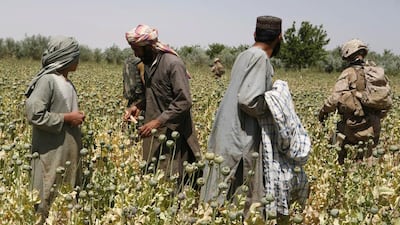Guerrilla groups throughout history have often resorted to crime to finance their political goals, so we should not be surprised that ISIL and other extremist groups are raising millions of dollars through sales of Captagon, a cheaply produced psycho-stimulant. But in the context of ISIL's claims of strict religious adherence for its self-declared caliphate in Syria and Iraq, the group's parallel role as a drug dealer serves merely to expose its rampant hypocrisy.
As we reported yesterday, a drug-enforcement forum in Dubai was told that illegal laboratories have sprung up in lawless areas caused by the Syrian conflict to produce amphetamines for sale throughout the Middle East and North Africa. The financial gains are potentially huge, with one estimate putting them at $19 million (Dh70m) a day.
The true cost of illicit drugs when measured in terms of human misery is, of course, unquantifiable. The damage they cause is why laws – whether of religious or political origin – have banned or at least strictly controlled the use of these kinds of drugs. Captagon has a legitimate use to treat ADHD in children, narcolepsy and depression, but its susceptibility to abuse as a psycho-stimulant is why its use is strictly proscribed. Obviously, the clandestine labs that manufacture Captagon also have no official oversight to ensure the version produced is the same as the official product.
The obvious double standard implicit in ISIL’s exploitation of the Captagon trade says volumes about this group. It claims to be following a strict interpretation of Islam in areas it controls by making women wear the hijab and men grow beards. But its resort to violence against innocents and of forcing non-Muslims to renounce their faith or face death shows that the group has twisted and misinterpreted the true message of Islam.
In that context, ISIL’s involvement in the illicit drugs trade to earn money to pursue its twisted agenda is just more proof of its hypocrisy and just how far from Islam the group really is.

